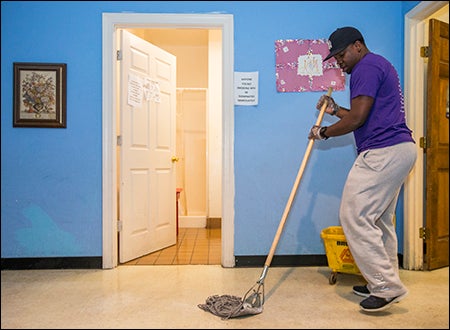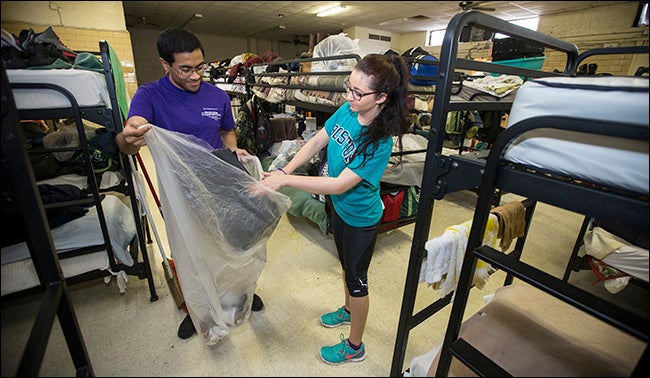SHELTER ‘STAYCATION’
Alternative spring break offers eye-opening experience in Greenville
Thirteen East Carolina University students passed up trips to warmer locales this week for a “staycation” in sleeping bags on the floor of the Greenville Community Shelter.
They lived on a $7 a day budget, walking to many of the places they went instead of driving.
“It gave them a feel for what our residents deal with on a daily basis,” said Casey Holland, the shelter’s program development director and retired ECU staff member. “We were very glad to have the students here.”
The students cooked and served breakfast and dinner and ate with the residents. They swept, vacuumed and mopped sleeping and living areas at the shelter. They also worked with other non-profit agencies including NC Civil, United Way of Pitt County, the Lucille W. Gorham Intergenerational Community Center, Third Street Community Center, Greenville Harvest and the Police Athletic League.
They saw a side of Greenville that many were previously unaware of. “It’s a new experience for me,” said Roderick Hall, a freshman from Riegelwood majoring in philosophy and political science. “The best way to understand somebody is to take a walk in their shoes.”
Hall wants to work with underprivileged youth and start his own non-profit organization one day. He enjoyed talking and playing games with the children at the shelter. “It’s been an amazing experience to sit down and listen to their stories,” Hall said. “It doesn’t matter if a kid is underprivileged or privileged, kids are kids.”

ECU student Mario Scott turned down traditional Spring Break activities to spend his time cooking and cleaning at the Greenville Community Shelter.
Many of the students didn’t know the shelter – only a few blocks from campus – was there.
“ECU has us a little bit sheltered,” said Mario Scott, a junior from Greensboro majoring in business management. “There are people in poverty in our own backyard. A lot of people don’t see this side of it.”
While some friends were heading to Florida for spring break, Scott was happy to stay behind. “It’s a better joy when you can help somebody,” Scott said. “You never know what someone is going through. You give thanks for what you have in your life.”
Talking with residents has been a reality check, Scott said. “You can have a four-year degree, and be homeless tomorrow,” he said.
The lack of safe, affordable housing, the absence of reliable transportation and stiff competition for jobs are detriments “for people trying to get their life back on track,” Holland told the students.
“I didn’t know much about what was going on in my own community so it was definitely an eye-opener,” said Khiana Wyatt, a junior from Wilson majoring in family and community services.
Wyatt’s first visit to the shelter was in October, when she led a student work group in “Make a Difference Day.” She also took part in last year’s alternative spring break trip to Baltimore, Maryland, which focused on hunger and homelessness.
As a child, Wyatt was enrolled in Head Start, which serves at-risk preschool children and their families. “Now I’m in college and thinking about grad school,” she said. “If I can do it, others can do it too. If they see me doing it, maybe they will be inspired.”
Holland hopes the students will share their experience and increase awareness about the non-profit agency, whose 78 beds have been consistently full since cold temperatures hit eastern North Carolina. The Manhattan Avenue shelter, which usually is open to residents overnight, remained open around the clock for at least 14 days when temperatures dipped to single digits, Holland said.

Josh Jackson, left, and Khiana Wyatt clean the floor during their “Staycation” in Greenville.
This was the first alternative break experience to be offered in Greenville, said Nichelle Shuck, associate director for student leadership and educational programs at ECU’s Volunteer and Service-Learning Center. “It’s interesting to see how what they’re doing connects with what they’re learning,” Shuck said.
“We’re breaking down barriers,” she said. “We’re looking critically at where we are and what our relationship with the community looks like.”
They’ve also talked about the words they use. “You’re not a homeless person. You’re a person experiencing homelessness. There’s a difference,” Shuck said.
As part of the trip, the students will write a collective essay, “This We Believe,” about their experience as well as make a video with photos and songs from the week.
ECU offers alternative break experiences throughout the year to create student learning opportunities in diverse environments that address social, economic, political, environmental, spiritual and cultural issues. Students learn through the exchange of ideas, personal reflection, critical thinking and by applying academic concepts outside the classroom.
Five trips were offered during spring break: paddling the Suwannee River in Florida; combatting urban poverty in metro Atlanta, Georgia; working on issues of poverty and health care in Baltimore, Maryland; seeking environmental justice, sustainability and economic impact in Atlantic Beach and Carteret County; and working on issues surrounding poverty and youth in Greenville.

ECU students Kishan Darji, left, and Mary Crabtree work together to straighten up the sleeping area at the Greenville Community Shelter.